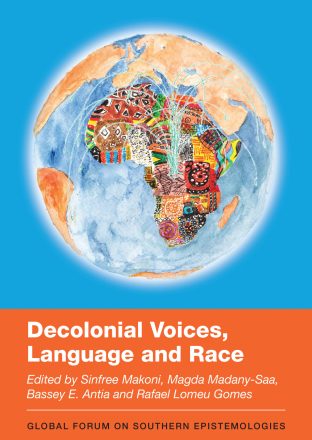- Insecurities in Language Policy and Planning: Decolonial Theories and Practices
- Critical Perspectives on Decoloniality: Southern Epistemologies and Epistemologies of the Souths
- Entanglements: Between Decolonial and Southernizing Linguistics
- Decolonial options in higher education: Cracks and fissures
- Foundational concepts of decolonial and southern epistemologies (Vol. 3)
- Shades of decolonial voices in linguistics (Vol. 2)
- Decolonial Voices, Language, and Race
1
Insecurities in Language Policy and Planning: Decolonial Theories and Practices
Published: January 13, 2026
Invites readers to question whether language planning and policy can survive decolonialization.
This book represents a vital step forward in the process of decolonizing language policy and planning (LPP). It addresses both theoretical and practical aspects of LPP, while exploring its intersection with domains including security, politics and education. A decolonized LPP invites us to view language as an interconnected phenomenon, with boundaries that are not defined by structural, territorial, ethnic or historical limitations.
The chapters in this book problematize the positivist, instrumental, pragmatic and technical dimensions of LPP, while offering a renewed perspective in dialogue with contemporary struggles and claims. It covers a range of geopolitical contexts, with particular attention to the dialogues and contradictions between the North and the South.
2
Critical Perspectives on Decoloniality: Southern Epistemologies and Epistemologies of the Souths
Published: September 16, 2025
This book is both a deep dive into and a critique of foundational decolonial concepts and epistemologies, engaging both historical, theoretical analyses of social issues and conditions, and standpoints from activism. The chapters are situated within multiple, plural and shifting force fields within the academy, and present a pathway to critically engage political or academic practices within and outside the university. The authors specifically engage contestations and harmonies in approaches of decoloniality, epistemic injustices, Southern epistemologies and epistemologies of the Souths. Alongside the theoretical chapters sit interventions on self-liberation, healing, reconstitution of human life, embracing interdependence and defying boundaries. The book represents a critical intervention in the development of decolonial theories and methodologies, and will be of interest to scholars, students and activists within and outside of academia.
3
Entanglements: Between Decolonial and Southernizing Linguistics
Published: August 12, 2025
This book explores the ways in which language is understood in diverse contexts, and how linguistic theories – and the idea of language as an object – fail to represent a reality that is inherently multi- and trans-. The chapters tease out the way that an understanding of language as a social practice, and the central role of the speaker(s) and their repertoire, allows for a more nuanced interpretation of language in contexts ranging from English as an international ‘neutral’ language in research and teaching, to the importance of life trajectories and multilingualism in the development of theoretical perspectives. The book offers a glimpse of a decolonial linguistics that recognizes the importance of entanglement – between languages, between the North and South and between the personal and the theoretical.
4
Decolonial options in higher education: Cracks and fissures
Published: June 10, 2025
In order for decolonization to avoid becoming yet another orthodoxy, this book argues that it is necessary to recognize the neoliberal ideologies and imperatives that drive so much work in universities in both the Global Norths and Global Souths, and to understand the enmeshment (both historical and ongoing) of universities in colonial practices. The chapters interrogate both these issues and the terms in which they are usually critiqued in order to identify the cracks and fissures within institutions that may enable decolonization to be leveraged as a praxis and a means of radical change. The chapters explore a range of issues across Higher Education including reparations, allyship, soft power, academic publishing and the politics of race within the university; together they represent an argument for the necessity of continually rethinking and re-making the theories, methods and assumptions of decolonization.
5
Foundational concepts of decolonial and southern epistemologies (Vol. 3)
Published: December 12, 2023
This book brings together 11 prominent scholars and political activists to discuss and explore issues around postcolonialism, decoloniality, Theories of the South and Epistemologies of the South. These wide-ranging discussions touch upon issues from academic research methods and writing conventions to global struggles for justice. Together the chapters, as well as the interventions from forum participants which are characteristic of this series, paint a complex and dynamic picture of areas of thought and action that are constantly evolving in response to the demands of a world in flux. The book is a major intervention in current debates about the geopolitics of knowledge, as well as an illustration of the ways in which scholarship in the Global North(s) is indebted to the diverse traditions of scholarship in the Global South(s).
6
Shades of decolonial voices in linguistics (Vol. 2)
Published: September 12, 2023
This book argues that Linguistics, in common with other disciplines such as Anthropology and Sociology, has been shaped by colonization. It outlines how linguistic practices may be decolonized, and the challenges which such decolonization poses to linguists working in diverse areas of Linguistics. It concludes that decolonization in Linguistics is an ongoing process with no definite end point and cannot be completely successful until universities and societies are decolonized too. In keeping with the subject matter, the book prioritizes discussion, debate and the collaborative, creative production of knowledge over individual authorship. Further, it mingles the voices of established authors from a variety of disciplines with audience comment and dialogue to produce a challenging and inspiring text that represents an important step along the path it attempts to map out.
7
Decolonial Voices, Language, and Race
Published: June 30, 2022
In the wake of #MeToo, Black Lives Matter, #rhodesmustfall and the Covid-19 pandemic, this groundbreaking book echoes the growing demand for decolonization of the production and dissemination of academic knowledge. Reflecting the dynamic and collaborative nature of online discussion, this conversational book features interviews with globally-renowned scholars working on language and race and the interactive discussion that followed and accompanied these interviews. Participants address issues including decoloniality; the interface of language, development and higher education; race and ethnicity in the justice system; lateral thinking and the intellectual history of linguistics; and race and gender in a biopolitics of knowledge production. Their discussion crosses disciplinary boundaries and is a vital step towards fracturing racialized and gendered epistemic systems and creating a decolonized academia.













![Visnja[41]](https://gvf.la.psu.edu/wp-content/uploads/sites/18/2022/05/Visnja41-150x150.jpg)
